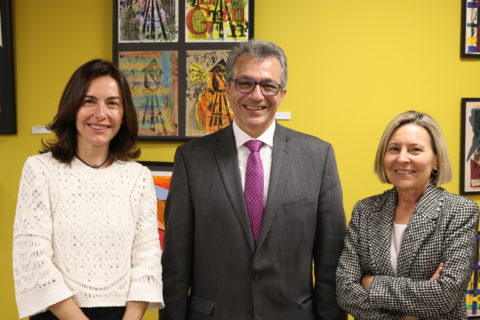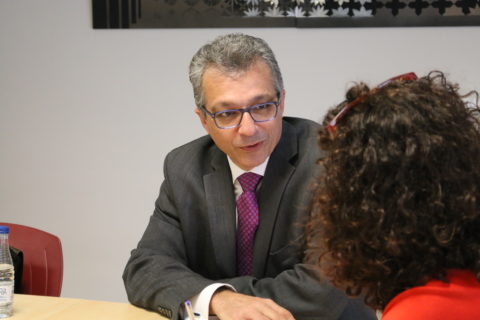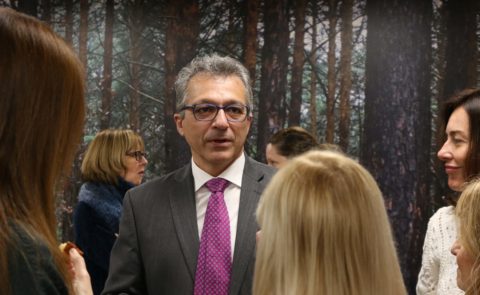Álvaro Pascual-Leone: “We are responsible for being the architects of our own brain”
The Researcher and Professor of Neurology at the Harvard School of Medicine attended the 3rd Forum on Innovation in Education organised by Caxton College, to talk about “The challenge of educating a healthy brain”.
One of the principal challenges of education is that of moulding an elastic brain and “helping a child to maintain the neural connections that are going to be vital for his/her future,” affirmed Pascual-Leone, addressing the auditorium which was fully booked for the event.
A foetus produces 250,000 neurons per minute. But, on birth, and during the first years of a child’s life, we start to lose them. So much so that, by the time we have reached University-going age, we have left approximately three quarters of them along the way. What can we do to reduce this loss and to keep the right neurons? “It is very important for schools and parents to carry out a programme of careful pruning, so that we are left with the neurons which will provide the child with the best possible quality of life,” stated Pascual-Leone, who was recognised by Thompson Reuters as one of the most influential minds in the scientific world, and one of the 15 top neuroscience researchers worldwide.
Neural enrichment
Some of the practices which the Valencian neurologist, who has lived in Boston for over two decades, points out as necessary for the brain to develop healthily from an early age are linked to the “culture of effort, in other words, the amount of determination that students put into their learning. And, although it may seem strange, rest is also critical for the brain to continue to work properly. Likewise, the impact that words can have on an education is fundamental. We must be very careful both with what we say and how we say it, because this will leave an imprint on children for the rest of their lives. For this reason, it is vitally important for them to see exemplary behaviour models among their family, friends and teachers,” affirms Professor Pascual-Leone.
Learning methods in schools
The prestigious neurology specialist insists that it is impossible to argue that one educational model is more effective than another. “What is clear, however, is that each stage of our life requires a different type of learning method and, in order for this to work properly, it must be personalised and flexible.” On this point, he spoke out in favour of a bilingual education. “The great advantage of bilingualism is that it is able to guide the students’ brains in a more enriching way,” he said.
During the talk, he explained that there are many factors that affect the elasticity of the brain and greater neural activity. It has been demonstrated that thinking about or imagining actions modifies the brain in the same way as when we actually do them. For this reason, warns Pascual-Leone, we must be very careful with what we think or imagine.
On the other hand, he pointed out that the brain is the vital organ that consumes most energy and that, at the same time, exercises most control over the rest of the body. Thus, if we can keep it healthy, we will guarantee our overall health, which will also help us to prevent future brain diseases such as Parkinson’s or Alzheimer’s.
But, can we make our brain fitter?
It would seem that we can. “A balanced diet, fifteen minutes physical exercise a day, the right amount of sleep, taking on new cognitive challenges and, above all, having a clearly defined life project, that is, having aspirations and a reason to get up every morning, and lastly, feeling supported by a social network of friends, family, and so on, are all of vital importance for neural activity,” confirms Pascual-Leone.
Everything that goes on around us and everything that we do affects our brain. In this sense, new technologies are changing our behaviour and the way we act but, “this does not necessarily mean that they are bad. The challenge for parents and teachers consists in teaching children how to use them properly. Technology provides children with new skills that are very useful, but that must be used with caution, because when they are misused, they can pose a risk,” confirms Professor Pascual-Leone.
Changing the paradigm
One of the main struggles that this researcher addressed in his speech was the need to create a paradigm shift, where work is done both in the prevention of mental disorders and in their early detection and cure. “Otherwise, we will lose entire generations. You must understand that health is more than the absence of disease.” On this matter, he assures that there exists a false belief whereby we think that after a certain age we do not generate more neurons and that as we get older, we begin to lose them. “It is not true, it has been shown that if we have a healthy brain, which has been properly cared for and trained, then we can continue to create neurons continuously until the very last day of our lives.” This fact forces us to rethink at a social level the way in which we view older people, who have lost certain skills but have acquired others that cannot be disregarded. “There is a loss of the social benefits to be obtained from the elderly that we should not allow to continue,” concludes Pascual-Leone.
We ask too much of young people
Parents tend to take their childrens’ frustrations very badly, and to have very high expectations of them. They want them to shine all the time, and in everything they do. This type of pressure only increases any problems and disorders that young people may have. “It’s true that nowadays, there are more young people with problems such as depression and anxiety, because we have better medical diagnoses. However, the pressure they receive from society, as well as our modern lifestyles and habits, are no help in protecting them. In this sense, they need to receive a good education which will train their brains well so that they know how to face up to the challenges of contemporary society and to become more resistant to these type of disorders,” states Dr. Pascual-Leone, who has developed a pioneering technique for non-invasive brain interventions, by means of the use of magnetic fields.
Humanising technology
During the conference, and at the meetings with teachers from Caxton College, Pascual-Leone reflected on the need for Science and the Humanities to work together to address the difficulties that are now becoming apparent in this new era of technology. “I wanted to be a philosopher, but in the end, I found the answers in Neuroscience,” he confesses. Perhaps this is the reason why his thoughts and ideas are instilled with a new humanism, which he has transmitted to all those who met him on his passage through Valencia, thanks to the invitation to the Caxton College 3rd Educational Innovation Forum.



